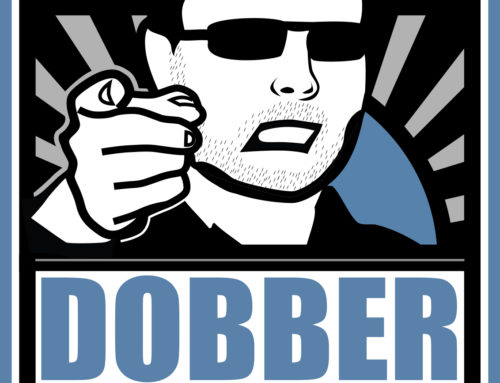
Drafting your team is not the end of your duties as a fantasy hockey manager. The addictive nature of fantasy leagues comes in large part from your ability to control the fate of your team, haggle with your fellow managers, and ultimately look down on them in victory. However, nothing spoils a great deal like the looming power of veto.
Veto has generated many topics on the forums at Dobber Hockey, and most of them are a result of lack of knowledge of veto rules or not having proper rules in the first place. What becomes so frustrating about each of these topics is that, almost without exception, every single one is preventable. If you are a commissioner of a league, setting up a new league, or changing rules in an existing league, it is this writer's hope that he can whisk your veto worries away. While the following is applicable to all league types, it is certainly directed more so at keeper leagues which rely on an explicit set of rules for ongoing success over a long period of time.
What is the job of a fantasy manager?
Simply put, a fantasy manager's job is to manage his team to achieve the outcome he desires. That outcome might be finishing in a certain position at season's end or achieving a certain team composition, but it doesn't really matter. The point is that the manager is able to make the decisions that lead to those outcomes.
The decisions a manager makes take into account many things on his own team, including the age and ability of his players, the positional balance on his team, specific scoring needs and position in the standings at any given time. Each manager looks at all these things (and more) not only in the context of their own team, but also in relation to other teams in the league and within the boundaries of the league's rules.
So what does any of that have to do with veto rules? Everything. Poor veto rules take the manager's job away from the manager and place it in the hands of someone else who is not running your team. Whether that person is the commissioner of the league or the other league managers, their primary concern is not the goals of your team. The fact is that you are competing against those other managers, so why should they have the opportunity to govern your dealings? They shouldn't!
What is the point of a veto?
Leagues tend to use vetoes for two reasons: grossly lopsided deals and collusion. With all due respect to leagues that use vetoes to overturn lopsided deals, stop it! What did you just read? A fantasy manager's job is to manage his team to achieve the outcome he desires. That means that all the other managers in your league are responsible for the same thing in regards to their own teams. Hence, if two managers negotiate a deal that achieves a desired outcome for each of them, where is the problem? Certainly there are managers of different knowledge or skill levels, but after a couple bad deals, those managers will learn. To impose a veto only keeps the poor managers afloat and penalizes skilled managers, neither of which is desirable or in the spirit of competition. So, to all those commissioners who use the excuse that veto should be used to keep balance in their league, there are other ways to keep balance – know who you're inviting into the league, keep less players from year to year, do a mid-season re-draft, or impose limits on transactions. For heaven's sake, don't use veto to second-guess your managers under the guise of "fairness" or "balance", because that act in itself is unfair.
And so we're left with the only true point of having a veto: eliminating collusion. Collusion occurs when two managers do a lopsided deal that (1) puts one of them in a position of power, and (2) yields an underhanded benefit for the other. In particular, such a deal might occur in a league where prize money is involved. For example, Manager A trades his top 3 scoring players to Manager B in exchange for a handful of 4th line grinders so that Manager B will have a chance at 1st place prize money. In exchange for the favour, Manager B agrees to split the winnings with Manager A. Veto rules are put in place to keep out this sort of unfair and underhanded dealing.
Common veto problems
1. Unclear or absent rules. If a situation arises that has an air of collusion, the rules have to be there to deal with it, and they have to be the same every time, otherwise the whole process becomes false and arbitrary. This inevitably leads to the next problem.
2. Doing it the commissioner's way. However it arises, if a commissioner is overly involved in the veto process, it is inevitable that some managers will view the commissioner's decision as somehow biased. Certainly the commissioner should have a role in the process, however to leave a bulk of the burden on the commissioner is unfair to the other managers and unfair to the commissioner himself.
3. Overly relaxed standards. Vetoing is a drastic remedy for specific situations, so it needs to have strict standards for judgment. If the standards are not strict enough, everyone in the league will apply their own different standards, which can only lead to confusion and lack of confidence when dealing. Having lax standards is the top of a slippery slope that leads to the next, and most argued, problem.
4. Abuse of veto. If nobody knows exactly what reasons are good enough to use a veto, chaos ensues. Pretty soon, all trades go through a veto vote. Managers begin to use the vote to nix trades that might put them at a disadvantage, that they see as even slightly lopsided, or because they have some sort of personal issue with a particular manager. Then we peruse Dobber's forum to see a manager complaining about a trade that got vetoed, and the vicious cycle continues. Stop the madness!
How to avoid veto issues
1. Rules first, league second. If you're new to a league, make sure that you know what the veto rules are, how often they are applied and in what circumstances. If you're starting a league, make sure that the veto rules are set out in painstaking detail. Managers will complain about the reading they have to do, but it will make life easier as the league moves forward.
2. Choose a high standard and strict procedure. You only want your veto rules to catch collusion, and you do not want them to enable abuse. Instead of a 50% vote, choose a 2/3 or 3/4 vote, and spell out in detail what sort of deal is meant to be caught. As well, design your procedure to go through different steps so that the decision doesn't fall too heavily on any one person. For example, establish a procedure for complaints, screening of complaints and investigation before putting it to a vote. While you may have a commissioner who is knowledgeable enough to take care of all that himself, it certainly is not necessary to leave the entire matter up to his personal judgment.
3. Allow time for investigation. Give the managers involved a chance to explain why they made the deal. Many deals, such as those done near the trade deadline, may appear somewhat lopsided, but there is often a rational explanation why each manager made the deal. Don't limit your investigation to the managers involved in the deal. Other managers may have insight, for example, as to why a manager places a different value on a particular player.
4. Know the managers in your league. If you know that you're getting into a league with a bunch of petty jerks, you're setting yourself up. By the same token, be aware of new managers coming into your league. Some leagues require managers with more skill than others, and many problems can be avoided simply by sorting out who can or cannot keep up.
In summary, all these things are a matter of common sense. Know the veto rules for your league and how they are applied. Watch out for leagues with a disparity in manager skill or experience. Know what kind of deal should or should not be vetoed. Keep all of this in mind and you'll save yourself a world of trouble. And if you get into a league that automatically puts every trade to a 50% veto vote, get your butt out!
Comment on vetoes in your pool here!





 TOR
TOR FLA
FLA VGK
VGK EDM
EDM DAL
DAL MIN
MIN WPG
WPG CAR
CAR CBJ
CBJ WSH
WSH NYR
NYR
